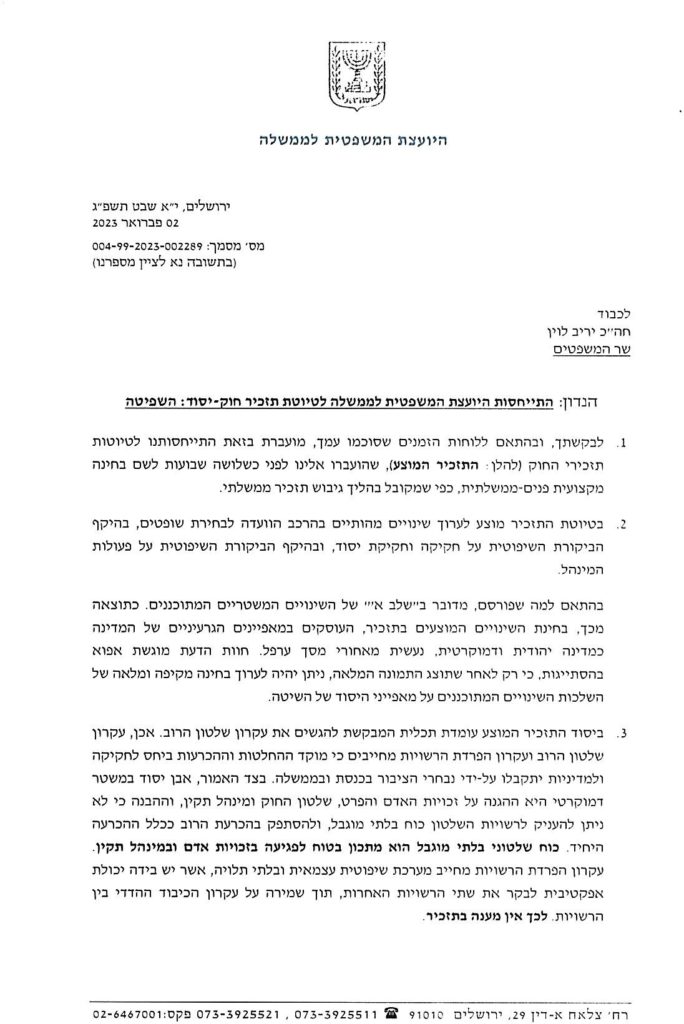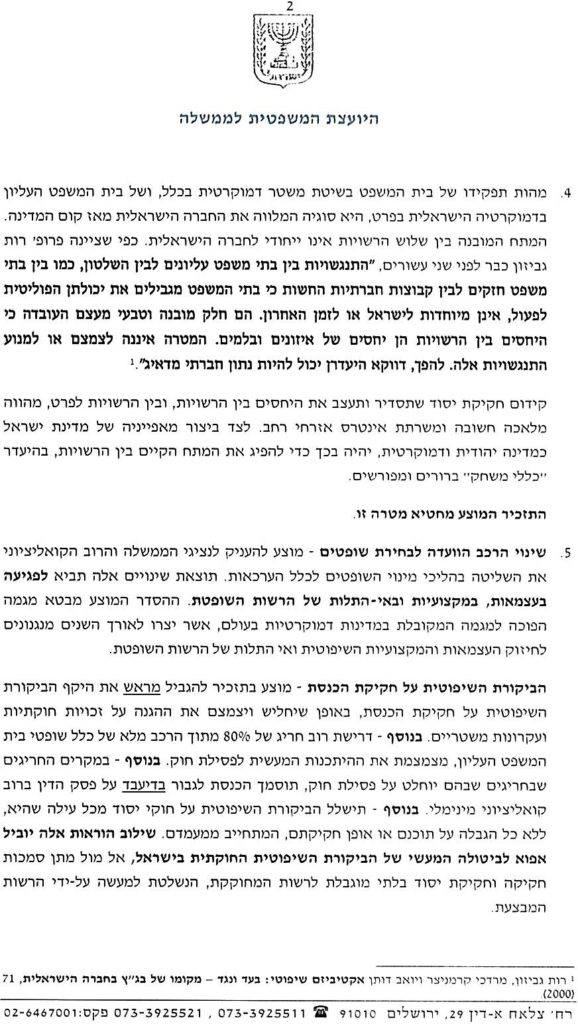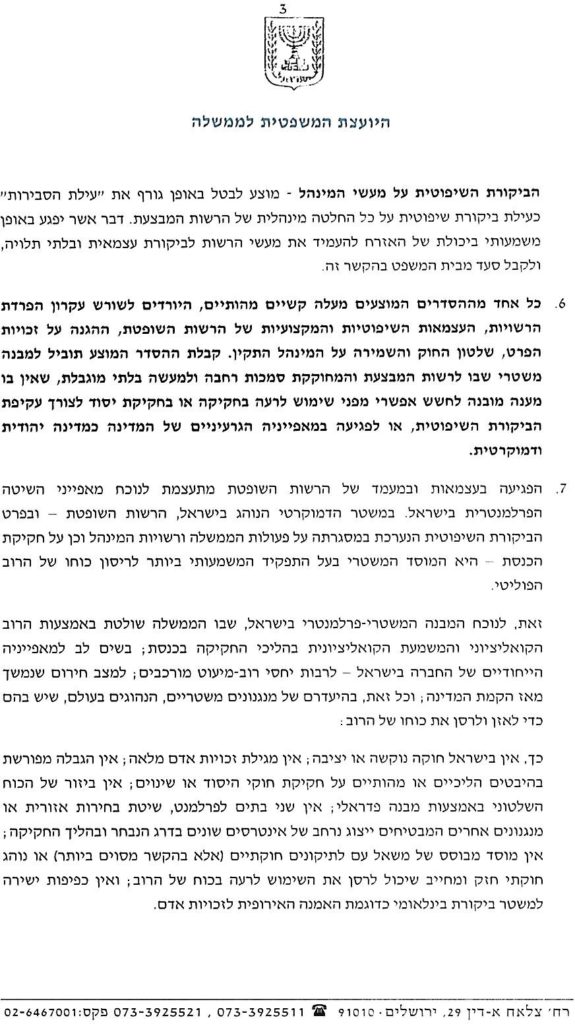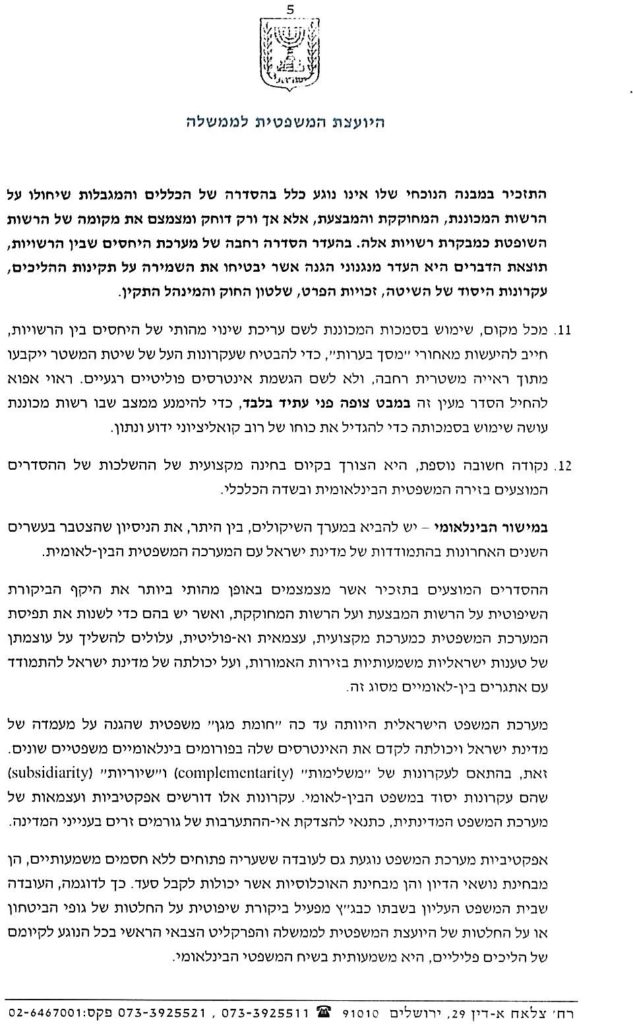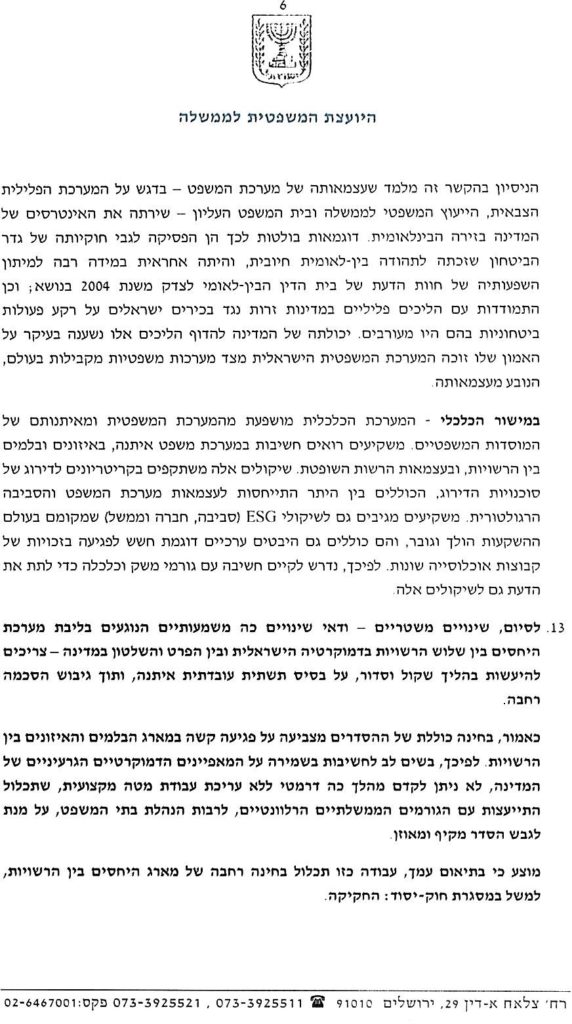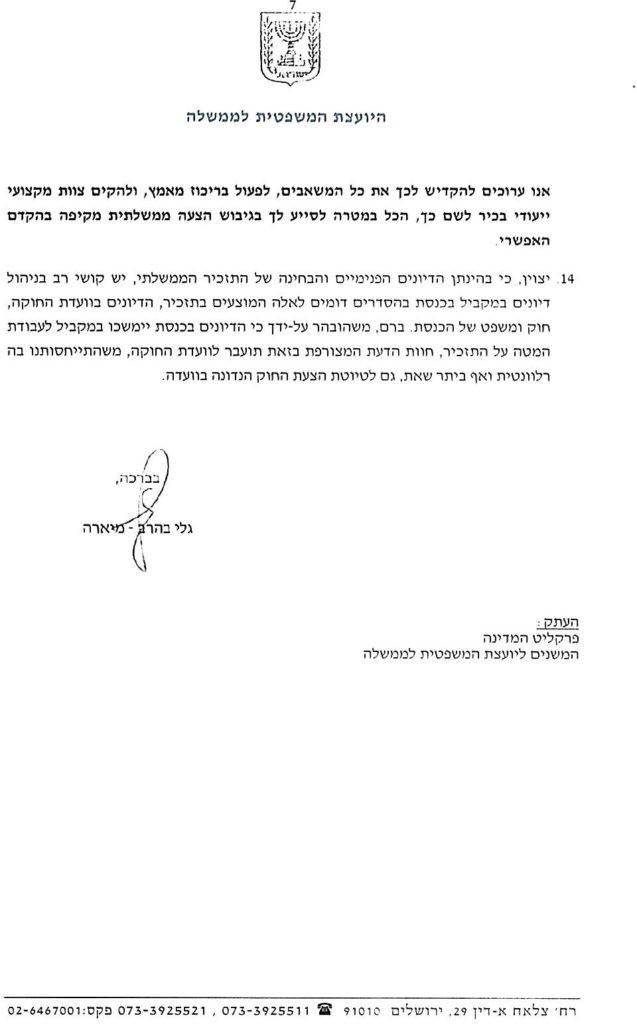The Attorney General’s position on the draft bill Basic Law: The Judiciary
(2 February 2023)
Source:
https://storage.googleapis.com/haaretz-cms-prod/2a/d3/416090814105b439650be0186758/ag-legal-opinion-english.pdf (note the Hebrew original of the letter follows here)
In January 2023, Israel’s Justice Minster Yariv Levin met with Israel’s Attorney General Gali Baharav-Miara regarding the Netanyahu government’s proposal to overhaul the judicial system. Three weeks later, on February 2, she released her review of the proposed changes to the Basic Law: The Judiciary. (Israel does not have a constitution but has 14 Basic Laws that form the parameters of Israel’s ‘constitutional’ system. The Seventh Basic Law of Israel, the Judiciary was passed by the Knesset in February 1984.) In this covering letter that introduces her 112-page review, Baharav-Miara explains why this proposed bill will harm Israel’s democracy. She acknowledges that governments need to review their prerogatives and procedures, while also understanding that this piece of proposed legislation will be followed by additional bills aimed at strengthening the parliament over the judiciary, thereby giving the parliament unequal if not unchecked power in Israel’s democracy.
Among her specific concerns in this partial picture, she argues that promoting majority rule does not protect human rights, proper governance, nor the rights of minorities within Israel. The bill should instead promote separation of powers and not increase tension between branches of government. She suggested that the Basic Laws should shape relations and dissipate tensions. In Israel’s system of government, the President lacks political strength as a president in the US enjoys in appointing federal judges or in vetoing legislation. The Israeli President can offer ideas but has view political prerogatives. Hence it is the Knesset and the judiciary that can wield influence over laws of the state.
As well, the bill will compound damage not only by changing the composition of the Judicial Selection Committee, that is, giving power to the parliament to choose judges, reversing a careful balance in judge selection where judges, politicians and the Israel Bar Association choose and vet judicial candidates.
The attorney general also argues that the bill selectively compares Israel to other democracies but misses the larger context; for instance, it fails to note that other democracies have constitutions and comprehensive human rights charters that Israel does not. She also uses an international lens to show how Israel’s impartial judicial system until now has been an effective tool in deflecting international criticism; the proposed changes will eliminate that protection.
Instead of rejecting the bill outright, Baharav-Miara adroitly offers to create a senior-level professional task force to work closely to produce a more comprehensive proposal that will better satisfy all concerns. Her suggestion to establish a task force to generate a compromise on the powers of the judiciary was endorsed by Israeli President Herzog a week after the Attorney General released her letter.
Wendy Kalmam and Ken Stein, February 14, 2023
The Attorney General of the State of Israel
Jerusalem, February 2, 2023
To: Mr. Yariv Levin, Knesset Member and Minister of Justice
Re: The Attorney General’s position on the draft bill Basic Law: The Judiciary
- Per your request, and in accordance with the agreed timetable, we hereby submit our memorandum concerning the draft bills we received three weeks ago, submitted for professional intra-governmental examination, as is customary when formulating a governmental bill (hereafter: the proposed draft bill).
- The draft bill proposes to make substantial changes in the judicial selection committee, in the scope of judicial oversight of legislation and Basic Laws, and in the scope of judicial oversight of administrative actions.
According to published information, this constitutes “Phase One” of planned changes to our system of governance. Thus, the examination of the proposed changes relating to the core characteristics of the State of Israel as both Jewish and democratic is taking place behind a veil of fog. Therefore, this legal memorandum is submitted with reservation because it will be possible to conduct a full and comprehensive examination of the implications of the planned changes to the fundamental characteristics of our system of governance only after the full picture is presented.
- The basic intention of the draft bill seeks to enable implementing the principle of majority rule. Indeed, both the principle of majority rule and the principle of separation of powers require that the center of decision-making and determinations regarding legislation and policy lie with elected public officials in the Knesset and in the government. However, the cornerstone of every democratic system of government is the protection of human and individual rights, the rule of law and proper governance, and the recognition that government branches cannot be accorded unlimited power, nor can the decision of the majority be relied on as the only ruling tenet. Giving unlimited power to the government is a sure recipe for infringing both human rights and proper governance. The principle of the separation of powers requires an autonomous, nonpartisan and independent judicial system that has an effective ability to check the other two branches, while maintaining the principle of mutual respect among the branches of government. This principle is not addressed in the draft bill.
- The essence of the role of the judiciary in a democracy in general, and of the Supreme Court in Israeli democracy in particular, has been an issue in Israeli society since the establishment of the state. The inherent tension that exists among the three branches of government is not unique to Israeli society. As Prof. Ruth Gavizon pointed out two decades ago, “Clashes between supreme courts and government, such as those between powerful courts and social groups that feel that the courts limit their political ability to act, are not unique to Israel or to recent times. They are a built-in and natural part of the very fact that the relations between the branches are those of checks and balances. The goal is not to reduce or prevent these conflicts. On the contrary, it is precisely their absence that can be a worrisome social circumstance.”
Promoting legislation of Basic Laws that would regulate and shape relations among the three branches of government and between the branches and the individual is an important task that serves a broad civil interest. In the absence of clear and precise “rules of the game,” this would also alleviate existing tensions among the branches, along with fortifying the character of the State of Israel as Jewish and democratic.
The proposed draft bill misses this goal.
- Changing the composition of the Judicial Selection Committee: The draft bill would give the ruling coalition and government representatives control of the process of appointing judges to all courts. The results of these changes would damage the independence, the professionalism, and the nonpartisan autonomy of the Judiciary. The proposed arrangement represents a trend in opposition to accepted trends in democratic countries throughout the world, which have, through the years, created mechanisms to strengthen judicial independence and professionalism, as well as the autonomy of the judiciary.
Judicial review of Knesset legislation: The draft bill proposes to limit, in advance, the scope of judicial review of laws the Knesset legislates, in a manner that would constrain and weaken both
the protection of constitutional rights and principles of governance. In addition, the draft bill’s proposed requirement of a supermajority of 80% of the full panel of Supreme Court justices narrows the practical probability of the overturn of any law. In addition, in the rarest of cases in which a law would be overturned, the Knesset, with a minimal coalition majority, would be authorized retroactively to overrule the court’s ruling. In addition, the court’s authority to conduct judicial review of legislation of Basic Laws would be completely revoked, leaving no limits at all both on the contents and on the legislative procedure governing the legislation of Basic Laws, all this despite their higher constitutional status. Taken together, these provisions will lead, therefore, to the practical abolition of judicial constitutional oversight in Israel, while granting unlimited authority to the Legislature—essentially controlled by the Executive Branch—to legislate all law, including Basic Laws.
Judicial review of Administrative actions: The draft bill proposes to completely cancel the Reasonableness Doctrine as grounds for judicial review of any administrative decision of the Executive Branch. This will significantly hinder a citizen’s access to legal recourse, to challenge the actions of the government through an independent process of review, and to receive redress from the courts in this context.
- Each of these proposed arrangements raises significant difficulties that go to the roots of the principle of the separation of powers, the independence and professional standards of the judicial branch, and to the protections of the rights of the individual, the rule of law, and proper governance. Acceptance of the proposed arrangement will lead to a governmental structure in which the executive and legislative branches have broad and, effectively, unlimited authority, with no structural solution to the possibility of abuse of power through the passage of legislation or Basic Laws designed to circumvent judicial review, or to the possibility of damage to the core characteristics of Israel as a Jewish and democratic state.
- The damage to the independence and status of the judicial branch is magnified in view of the characteristics of Israel’s parliamentary system. In the democratic system practiced in Israel, the judiciary—and in particular the judicial review carried out over the actions of the government and the administrative authorities, as well as over the legislation of the Knesset—is the most significant governmental institution in constraining the power of the political majority.
This is in light of Israel’s parliamentary structure, in which the government controls the legislative process in the Knesset through the coalition majority and coalition discipline; while noting the unique characteristics of Israeli society—particularly, the complex relationship between majority and minority; the continual state of emergency ongoing since the establishment of the state; and all this, in the absence of established mechanisms of governance that are common in other countries throughout the world and that have the capacity to balance and place constraints on the power of the majority:
Thus, Israel has no strict or stable constitution; no comprehensive human rights charter; no explicit restrictions regarding procedural or substantive aspects in the legislation of Basic Laws or changes to them; no decentralization of governmental power through a federal structure; no two houses of parliament, no regional election system or other mechanism to ensure broad representation of different interests at the level of the elected representative or in the legislative process; no established practice for conducting referenda on constitutional amendments (except in a very specific context) nor a strong and binding constitutional protocol that can curb the abuse of power by the majority; and there is no direct commitment to submitting to judicial review by an international system such as the European Convention on Human Rights.
- Another significant difficulty in the draft bill touches on the way it relies on comparative law. Missing at the heart of the bill is factual underpinning in relation to other democratic countries. That a certain component of the proposed arrangement exists in another country is not enough to justify its adoption into the Israeli system. In dealing with a system of checks and balances, no component stands alone, rather as part of the whole system. An attempt to adopt an established institutional mechanism found in another legal system while ignoring the context in which it emerged, in contrast to the local context and its unique characteristics, is destined for failure and threatens to distort the system of balances as a whole.
In fact, a broad comparative examination indicates that the proposed arrangement would place Israel in an outlying position compared to other democratic countries, and in opposition to the trends that can be identified in those countries, with regard, among other things, to strengthening protections of human rights and judicial review of legislation.
- Moreover, the combination of the arrangements together in the draft bill lacks internal logic, and the overall proposal is not coherent.
- For example, the justification for increasing the control of the representatives of the government and the majority coalition over the Judicial Selection Committee is the claim that the courts interfere too much in public, constitutional, and governmental issues. At the same time, however, it proposes to limit from the outset the authority of the court to discuss these issues. Similarly, the claim that a majority of Knesset members should be able to invoke the “Override Clause” is based on the desire to address the Supreme Court’s alleged over-intervention in primary legislation. But at the same time, the bill proposes in practice to all but completely curtail the Court’s ability to invalidate legislation in the first place. Thus, one proposed provision negates the need claimed for by the other. Apart from the content of the bill’s proposed arrangement, which, as mentioned, is unbalanced and full of significant problems, another fundamental difficulty is hidden in what is absent from it— which is the lack of a Basic Law: The Legislation, i.e., the most important piece of the puzzle is lacking completely.
The bill is presented as an amendment to Basic Law: The Judiciary, and deals exclusively with the judiciary, its composition, and limitations to its judicial authority in treating issues of constitutionality and governance. Beyond the difficulties caused by the provisions themselves, the incompleteness of the proposed arrangement raises a most significant difficulty regarding the use of constituent authority. The bill does not refer to the basic rules relating to legislation, chiefly, the procedures for legislating ordinary laws and Basic Laws. In fact, the bill does the exact opposite. It proposes to positively establish that Basic Law legislation be unlimited, both in the content it deals with and the manner in which it is decided on by the Knesset.
In contrast, Basic Law: The Legislation, in keeping with a variety of models proposed in the past, is intended to regulate the rules “within” Knesset procedure, i.e., the Knesset’s authority to legislate, the process of legislation, the relationship between ordinary legislation and Basic Law legislation, as well as judicial review of these ordinary and Basic Laws.
In its current form, this draft bill does not touch at all on the arrangement of the rules and limitations that will apply to the constituent authority, and the legislative and executive branches. Rather it pushes out and diminishes the place of the Judiciary in monitoring these branches. Having no broad protocol for regulating the relationship among the government branches will result in an absence of the safeguards that ensure the preservation of the integrity of the procedures and fundamental principles of the system, the rights of the individual, the rule of law, and proper governance.
- In any event, using constituent authority to make a fundamental change in the relationship among the government branches must be done behind “a veil of ignorance” to ensure that the overarching principles of the system of government are determined with a broad view of the system, and not to fulfill transitory political interests. It is therefore appropriate to apply this kind of arrangement only with a view to the future, to avoid a situation in which a constituent body abuses its authority in order to increase the power of a given coalition majority.
- Another important point is the need for a professional examination of the ramifications of these proposals in the international legal arena and on the economic plane.
- On the international level: The experience of the State of Israel, accumulated over the last twenty years in its dealings in the arena of international law must, among other things, be taken into consideration.
The amendments proposed in the draft bill, which very substantially reduce the scope of judicial review of the executive and legislative branches and which have the effect of changing the perception of our judicial system as professional, independent, and apolitical, may have ramifications for the strength of Israeli arguments in these arenas, and on the state’s ability to cope with international challenges of this kind.
The Israeli legal system has until now acted as a legal “protective wall” defending the State of Israel’s standing and its ability to promote its interests in various international legal forums, in accordance with the principles of “complementarity” and “subsidiarity,” basic principles of international law. These principles require the effectiveness and independence of the state judicial system as a condition for justifying the non-interference of foreign parties in affairs of the state.
The effectiveness of the judicial system also relates to the fact that its doors are open to all, with no significant limitations either on the subjects litigated nor on the sectors of the society seeking redress. For example, the fact that the Supreme Court in its sitting as the High Court of Justice exercises judicial review of decisions made by various state security bodies, or decisions made by the Attorney General and the Chief Military Prosecutor regarding criminal proceedings, carries significance in international legal discourse.
Experience in this context shows that the independence of the judicial system—especially the military criminal system, the Attorney General’s Office, and the Supreme Court—has served the interests of the State of Israel in the international arena. Prominent examples of this are the ruling regarding the legality of the security barrier, which was received positively by the international community, and which was largely responsible for moderating the effects of the opinion of the International Court of Justice on the matter in 2004; as well as in dealing with criminal proceedings in foreign countries against senior Israeli officials based on their involvement in security operations. The state’s ability to fend off these proceedings has rested mainly on the trust that parallel legal systems throughout the world have in the Israeli legal system, stemming from its independence.
On the economic level: The economic system is affected by the legal system and by the strength of the legal institutions. Investors see importance in a strong legal system, in the checks and balances among the government branches, and in the independence of the judiciary. These considerations are reflected in the criteria employed by credit-rating agencies in determining countries’ credit ratings, which include, among other things, consideration of the independence of the judicial system and of the regulatory environment. Investors also respond to ESG (environment, society, and government) considerations whose position in the investment world is rising. They also include aspects of moral values, such as the concern over the infringement of the rights of various sectors of the population. Therefore, market and economic actors must also be consulted in considering these factors.
- In conclusion, systemic regime changes—certainly such significant changes that affect the core of the relationship among the three government branches in Israel’s democracy, and between the individual and the country’s government—need to be made in a well-considered and orderly manner, based on a solid factual underpinning, and through the forging of broad consensus.
As stated, a comprehensive examination of the proposed amendments indicates that they would cause serious damage to the fabric of checks and balances among the government branches. Therefore, in noting the importance of maintaining the core democratic characteristics of the country, such a dramatic course of action cannot be promoted without first conducting thorough professional staff work, that would include consultation with the relevant government bodies, including the Court Administration Authority, in order to formulate a comprehensive and balanced proposal.
It is hereby suggested that in coordination with you, such work will include a broad examination of the relationship among the branches of government, e.g., within the framework of Basic Law: The Legislation.
We are prepared to devote all our resources to this project, to focus our efforts, and to establish a senior-level professional task force, and all of this with the aim of assisting you in formulating a comprehensive governmental proposal as soon as possible.
It should be noted that given the internal discussions and examination of the government draft bill, conducting parallel discussions in the Knesset with amendments similar to those proposed in this bill, such as the discussions in the Constitutional, Legislative, and Judicial Committee of the Knesset, presents great difficulty. However, given that you clarified that the Knesset discussions will continue concurrently with the staff work on the proposed bill, the legal memorandum attached here will be forwarded to the Constitutional, Legislative, and Judicial Committee, since our considered opinion to the draft bill is all the more relevant to the draft bill being discussed in the committee.
Sincerely,
Gali Baharav-Miara
CC:
The State Attorney
Deputies to the Attorney General
- Privately translated into English by concerned citizens. The following are the introductory pages to the full legal memorandum of 112 pages, the translation of which will be circulated separately. The original Hebrew introductory pages to the AG position on the draft bill Basic Law: The Judiciary, are attached.
- Translator’s note: “the government” in a parliamentary system such as Israel’s, refers to the executive branch, i.e. all ministers and their offices.
- Ruth Gavizon, Mordechai Kremnitzer, and Yoav Dotan, Judicial Activism: Pros and Cons—The Place of the High Court in Israeli Society, 71 [2000].
